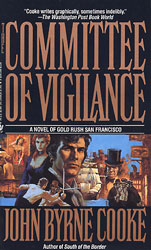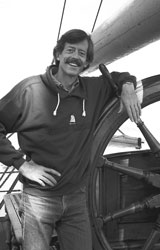"On this historical framework, Cooke hangs a convincing tale, employing characters both real and imagined." - San Francisco Chronicle
"What he writes is about as good as you can get west of the Mississippi and that means very good indeed....Cooke has an uncanny gift in evoking lost times."
- Dale Walker, Rocky Mountain News
"Cooke skillfully weaves his story by blending an unforgettable cast of historical and fictional characters. This is a book to be savored." - El Paso Herald Post
The following review by Doris Meredith appeared in the September-October 1994 issue of Roundup Magazine, the bi-monthly publication of the Western Writers of America, Inc., and in the Amarillo, Texas, News-Globe.
"I once defined the duty of the historical novelist as one of putting imaginary toads into real gardens, and Cooke has again demonstrated his flair for doing exactly that. His garden--San Francisco in 1856--is real both politically and physically. Meticulous research into the corruption, graft, economic upheavals, political rivalries, and personal grudges is integrated with the story in such a subtle manner that the casual reader is able to understand the complexities of events and personalities that lead to the Committee of Vigilance's revival, while at the same time observing the city's busy and constantly changing landscape.
"Special note should be made of Cooke's ability to humanize such historical figures as Governor Johnson, Judge Terry and General Sherman. Relying on letters, journals, and other written documents, Cooke rounds out the personalities of these particular individuals--his real toads in this real garden--so that each is a fully developed character who also happens to have actually lived and influenced events. There is none of the stilted dialogue and stereotyped behavior often found when a less gifted novelist portrays historical figures in action.
"Rubbing shoulders with these real people and observing the real events are Cooke's imaginary toads, fictional characters who either live at Sarah Rockwell's boarding house or have some association with those who do. Among them are Jason Beck, captain of a China clipper ship, who only wants to sell his cargo of rice and return to the sea, but speculation by local merchants has ruined the market for rice; Sarah, the young widow who owns the boarding house; Thomas Trelayne, a theatrical manager; and his leading lady, Molly Gray. Sarah's comment concerning Molly's careless treatment of Trelayne is only one example of Cooke's frequent eloquence and his perceptive characterization: "She repairs the damage she has done as soon as she notices it." Indeed, Sarah's observations of events and individuals provide insight into the motivation of others, as well as a cold look at the political chaos engulfing San Francisco.
"Other major and minor fictional characters provide differing views of the civic unrest. Su-Yan Quan is a merchant who wants to keep the Chinese out of what he perceives as a confrontation that could erupt into senseless violence. Dickie Howell is an orphan and a wharf rat who runs errands for the Commitee and uncovers hidden truths that bring about the book's climactic ending. Perhaps the most intriguing character in the book is Abel Calvert, a former fur trapper who becomes a banker. He holds those he calls 'city men,' other bankers and merchants who never earned their living by hard labor, in contempt, and holds them responsible for ruining the fur trade he loved so much. One sympathizes with Calvert while at the same time abhorring certain of his acts.
"Thomas Trelayne and Abel Calvert symbolize the mixed motives and obsessions of the opposing sides of San Francisco's conflict. Trelayne writes plays that accuse the Committee of slaying justice, but he himself acts out of less than noble motives when he deliberately provokes Calvert into a duel he knows will humiliate the other man and destroy Molly's hopes of a happy marriage. Calvert abuses the power his position in the Committee gives him, yet believes in the political reforms sought by the members of the organization.
"A very complex book that is both political novel and historical saga, interesting, entertaining, and terrifying. In these days of self-appointed advocates and one-issue causes, Cooke's novel is a cry in the wilderness warning of the dangers of either circumventing the Constitution or twisting its meaning. Unfortunately, Mr. Cooke's cry is in the form of an original paperback, and I fear that its sound will be smothered by the lurid covers and empty words of a thousand less worthy titles. Too bad. This is too good a novel, too important a theme, to waste."
As they reached Montgomery Street, Kent was nearly knocked off his feet by a smaller man who careened into him and strode on without pausing.
"Now see here!" Kent protested, but the man's attention was fixed on another man coming out of an office across the street and part way down the block.
"Come on! Come on, now!" the smaller man cried.
The other man, taller and powerfully built, saw the speaker approaching and stopped where he was. On the street, a space opened around the smaller man as the passersby fell back.
"Come on, then!" the man shouted again.
"That's Casey," Kent exclaimed. "Good God! He's after King of William."
The open space on the street widened like a ship's wake. It reached the taller man and passed him by, leaving him alone to face the small man's challenge.
"Are you armed?" the one called Casey demanded of the tall man. He wore a short cloak that concealed his hands.
The tall man said something that was lost in the noise of the street. Apparently he had tried to make a joke, but his smile was halfhearted. His arms were folded, his left hand inside the right breast of his coat.
Casey strode forward until he had closed half the distance between himself and his quarry. "Prepare to defend yourself!" he said.
Oblivious to the scene in the street, a young woman in a gray cape pushed through the crowd that had gathered around Jason and Kent. Jason took her arm as she tried to force her way past him. Her face was smooth and unlined and her eyes bright with resentment when they met his. She tried to pull free but he kept his grip. "There's trouble here, Miss," he warned her, and nodded toward the street. They were the first words he had spoken to a woman since the Chilean port of Antofagasta. The woman there had been a softspoken chilena who was fluent in the silent language of passion but understood no English.
At that moment, Casey let his short cloak fall to the ground and Jason saw that he held a revolver.
"Defend yourself!" Casey cried. Across the street, the tall man dropped his free arm and brought the other out from under his coat. Wide-eyed, Casey raised his pistol.
Shouts came from the crowd and a woman screamed.
The onlookers surged back as Casey fired.
"Oh, Lord!" the tall man staggered. "Oh, Lord!" He clutched his shoulder. "Oh, my arm!"
Casey braced his pistol against one knee and used both hands to cock it while three men rushed to assist the wounded man. They supported him on either side and led him through the doorway of the Pacific Express Company.
With his pistol cocked, Casey looked up, found his quarry missing, and became aware for the first time that a hundred pairs of eyes were upon him. The onlookers began to move, giving the small man a wide berth. Casey bent to retrieve his cloak. He threw it over the hand holding the gun and moved off up Washington Street.
Jason was aware of every sight and sound as the street came back to life. Forty years' experience in street and saloon brawls had trained him to summon all his resources on short notice, but since he had been a ship's captain his own participation in such affrays was less frequent.
"He will get away!" The cry came from a man across the street, one of a pair of well-dressed merchants who had witnessed the shooting. "Don't let the police have him!" called the second merchant.
"Why don't they want the police to have him?" Jason said.
Stephen Kent found his voice. "Because the police are Democrats, like Casey."
From the other side of Washington Street a man moved to intercept Casey. He took hold of his arm when he reached him. Casey tried to shrug off the grip in a halfhearted manner, then seemed to change his mind and allowed the man to lead him away.
Jason became aware that he was still holding the young woman's arm. She had made no further attempt to free herself since the shooting. He released her and bowed in apology. "I meant no offense, Miss. Just to keep you from harm."
"I thank you, sir." Her voice was almost inaudible. She looked back once as she started off, then vanished among the onlookers, who were talking among themselves, raising a hubbub in the street and moving every which way like a school of fish that had lost their bearings, it seemed to Jason.
"The fat is in the fire now," Kent said.
"What is it all about?"
Kent snorted. "Come along. The best saloon in the city is just here. You will need a drink to understand San Francisco politics. They are a witch's brew."

